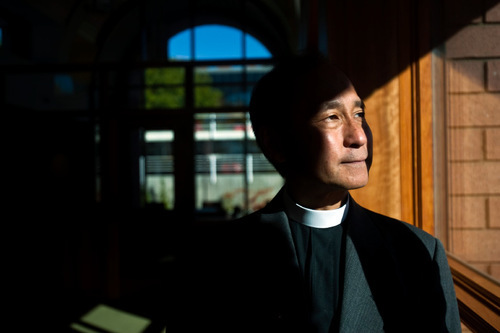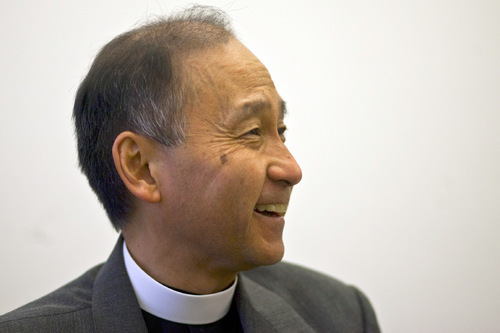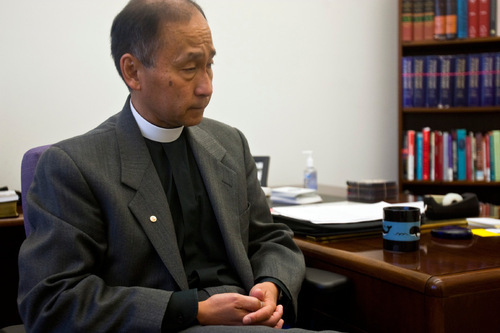This is an archived article that was published on sltrib.com in 2010, and information in the article may be outdated. It is provided only for personal research purposes and may not be reprinted.
The first time the Rev. Scott Hayashi served Utah's Episcopal Church, he was puzzled by some parishioners' tendency to define themselves by what they weren't: Mormons.
He even remembers pointing out the silliness in a sermon at Ogden's Episcopal Church of the Good Shepherd, where he was rector from 1989 to 1998.
"I asked, 'Does this mean if the LDS people are against gambling, we should be for it? If the LDS people have the Mormon diet and believe whole grains, moderation in eating and getting exercise is what you should do, that means we should eat all high-fat foods and not exercise? If the LDS people are against smoking, that means we should all be smoking like chimneys? Does this make any sense?' "
The next bishop for Utah's 5,200 Episcopalians now frames the question this way: "Shouldn't we have an identity that is formed on the positive, as opposed to being against something?"
Hayashi, 56, will be consecrated as Utah's 11th Episcopal bishop Saturday by the Episcopal Church's presiding bishop, the Rev. Katharine Jefferts Schori, in a ceremony at The Grand America Hotel in downtown Salt Lake City.
Bishops and clergy from throughout the nation as well as Mexico and Myanmar are expected to be among the 700-plus attending the event.
Hayashi replaces the Rev. Carolyn Tanner Irish, who is retiring after serving as bishop since 1996. She and her husband are moving to Washington, D.C., although they will maintain a home in Salt Lake City for her visits as chairwoman of the O.C. Tanner Co. board.
Hayashi was elected bishop of Utah's oldest Protestant denomination during a May 22 convention that was quick and unambiguous. The clergy and the lay electors chose him on the second ballot. It took five to elect Irish.
The canon to the ordinary in the Chicago Diocese — acting as the bishop's confidant and chief of staff for the past five years — Hayashi said he was probably deemed the safe choice among the four candidates for the Utah post. He has been married for 30 years, is a father of three and is a priest with pastoral and administrative skills. And, because he knows Utah, his learning curve will be less steep.
One of the electors, though, says it wasn't just that Hayashi knows the Beehive State and its unique religious landscape. It's that he wants to be part of it, said Tracey Norton, a member of St. John's Episcopal Church in Logan.
"He has a sincere wish to be back here."
—
Message of inclusivity • Utah Episcopalians seem less inclined, Hayashi says, to forge their identity in opposition to The Church of Jesus Christ of Latter-day Saints than they did two decades ago.
Yet with ex-Mormons making up a sizable chunk of the Episcopal rolls, the tendency persists among many parishioners.
Even before becoming bishop, Hayashi was signaling what he expects of Episcopalians in their relations with the state's predominant LDS faith.
Hayashi preached in mid-October at St. Mark's Cathedral in Salt Lake City that, while Episcopalians must continue to press their message of inclusivity and justice, they should never demonize those who differ.
Nor should they assume, Hayashi said, that they are always in the right.
He brought up senior LDS apostle Boyd K. Packer, who called same-sex attraction "impure and unnatural" during last month's General Conference but later tempered his comments before they were published on the church's website.
Hayashi questioned whether Packer changed his words in response to the "hue and cry" of critics, just as the judge in the parable from Luke's Gospel finally acted on the complaints of a determined woman seeking justice.
"The point is," Hayashi says, "if we don't persist, how does anything get changed?"
From the pulpit, though, Hayashi says he was careful to stress that Packer is unconditionally loved by God and that Episcopalians should criticize systems or institutions, not individuals.
"I would defend, to my last breath, President Packer's right to say whatever he chooses to say ... without people saying he's evil. Because he's not. He is one of the great leaders of the LDS Church."
Hayashi says his own sermon was also meant as reminder about humility.
"We know we can err," he said. "We shouldn't assume that all we say and do is in line with God's mission."
—
Asking questions • The new bishop's path to the cathedral began in a Tacoma, Wash., home, with virtually no religion. What little he knew about Christianity came from the "Perry Como Christmas" show on television or from occasional holiday visits to a Methodist church.
When he was 15, his life was forever changed by something an evangelical speaker said during a meeting of the Young Life nondenominational group.
"I can't tell you what he was saying," Hayashi said. "All I can say is something made sense. It clicked. Something inside shifted."
After that, Hayashi began asking questions about Christianity, studying the Bible and becoming active in Young Life — even as his parents, a brother and a sister remained aloof when it came to religion.
His research eventually took him to Harvard Divinity School, where he earned a master of divinity degree and met his future wife, Amy Perlman O'Donnell, an artist and student at Episcopal Divinity School. He began attending Episcopal services with her, and he fell in love with the liturgy and the church's high regard for scholarship.
"Some people say, 'I'm spiritual, but not religious.' I'd say the way we are spiritual is through [religion]." The faith, he says, is a vehicle for the quest he began as a teen, to "reach the deepest sense of reality."
"It's been away from where I grew up, away from family," Hayashi said. "It really has been that movement that has taken me away but opened up a whole different vista."
—
"Period of cleansing" • In the bustling days before his consecration, Hayashi took a trip to White- rocks, on eastern Utah's Uintah and Ouray reservation.
Stripped down to his swimming trunks on a stormy Saturday, he sat on the bare ground of a sweat lodge belonging to Clifford Duncan, a Ute elder and spiritual leader. Water on fired rocks filled the lodge with hot, humid air for two hours.
"I wanted this to be a period of really seeking out God's guidance," Hayashi said, "and a period of cleansing."
But there was something more.
"I wanted to connect to the people in Whiterocks," Hayashi said.
Connection could be Hayashi's theme, a word that captures how he sees his role as bishop in a diocese that covers all 24 parishes in Utah and Page, Ariz.
That Hayashi would ask the Utes for a sweat-lodge ceremony was "big," says the Rev. Suzanne Duffield, pastor of St. Elizabeth's Episcopal Church in Whiterocks, a three-hour car trip from Salt Lake City.
"It's pretty easy to forget we're out here," Duffield says. "He wants to understand the culture of the indigenous people who are part of his people."
Carolyn Roll, senior warden at St. Mark's, says Hayashi struck the same chord at the cathedral, where he spent 45 minutes after recent services chatting with parishioners.
"He has said, 'I can't get to know people unless I spend time with them,' " Roll said.
Since Sept. 1, Hayashi has made it a point to meet with every Episcopal pastor who has a congregation to discuss their concerns and share his own exercise regimen and prayer life. He is, he says, "pastor to the pastors."
"Building that framework and that relationship, to me, was the most important thing out of the gate," Hayashi said. "The work of the clergy takes stamina. I want them physically healthy as well as spiritually healthy."
As he sees it, the ministry for every Episcopal congregation is beyond the church building.
"How can I expect any congregation to take seriously my call to step outside the front door and take a look at what's there unless I model that?"
The Rev. Scott Hayashi
Born • Tacoma, Wash., Dec. 9, 1953.
Family • Married to Amy Perlman O'Donnell. They have three daughters: Elisabeth manages a small jewelry store in California; Miyuki teaches English in Japan; and Katherine is a sophomore at Rowland Hall in Salt Lake City. The family lives in Cottonwood Heights.
Education • Bachelor's degree in social work from the University of Washington, 1977; master of divinity degree from Harvard Divinity School, 1981.
Ministry • Ordained, 1984; vicar of St. John the Baptist Episcopal Mission and St. Dunstan's Episcopal Mission, both in Washington state, 1984-1989; rector of the Episcopal Church of the Good Shepherd in Ogden, 1989-1998; rector of Christ Church Episcopal Church in Portola Valley/Woodside, Calif., 1998-2005; canon to the ordinary in the Episcopal Diocese of Chicago, 2005-2010; elected Utah's 11th bishop, May 22, 2010. —
This week's events
P The Rev. Scott Hayashi will be consecrated as Utah's 11th Episcopal bishop at 11 a.m. Saturday at The Grand America Hotel in downtown Salt Lake City.
The Rev. Katharine Jefferts Schori, presiding bishop of the Episcopal Church, will consecrate the new bishop before an estimated 700 Utah Episcopalians and 21 bishops from throughout the country as well as Mexico and Myanmar.
The service is open to the public. No tickets are required.
A live webcast of the consecration will begin at 10:55 a.m. A link is available on diocese website at http://www.episcopal-ut.org/.
At 10:30 a.m., Sunday, Hayashi will be seated at St. Mark's Cathedral, 231 E. 100 South, Salt Lake City.







